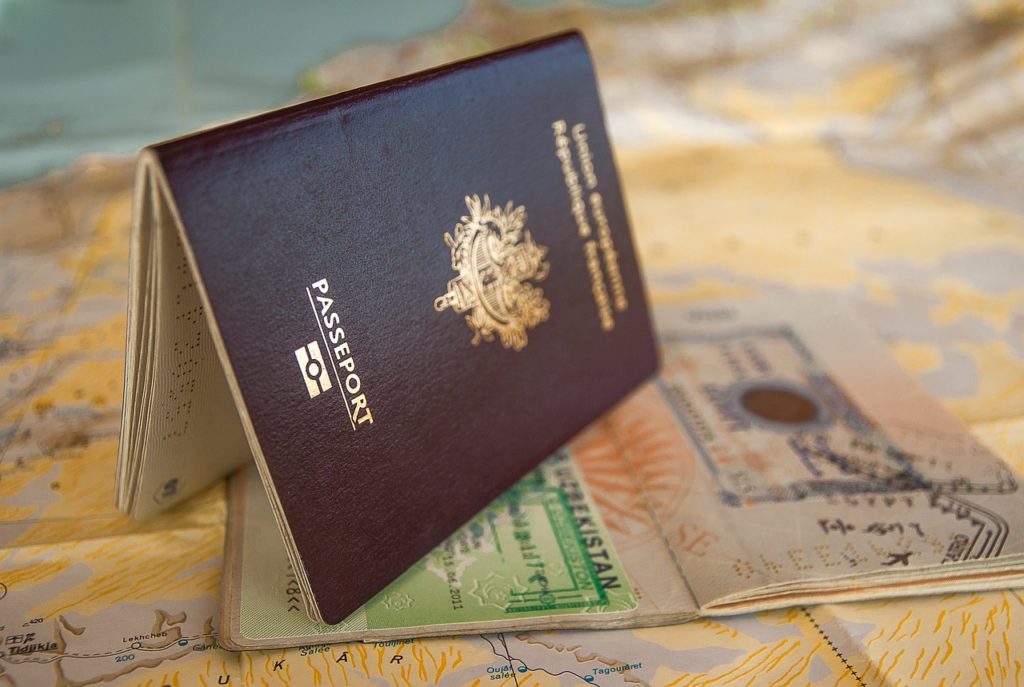Spain is a wonderful country to come to study in for so many reasons: great weather, high academic standards, rich history and culture, low cost of living, fun people.
It is a fantastic place to live and grow personally, academically, and professionally.
We very much hope you are planning on coming to Spain to study and will now provide you with all the necessary information regarding obtaining a Student Visa in Spain.
Applying for a Student Visa in Spain is not a simple process and it cannot be rushed.
We recommend that you give yourself plenty of time to gather together all of the necessary information and documentation for your visa and allow the authorities plenty of time (four to eight weeks) to process your application.
We understand the procedure can be overwhelming, that’s why in Go! Go! España we partner with a Spanish immigration lawyer that can apply for the Student Visa on your behalf.
If you would like to get professional legal support from a Spanish law firm please contact us here.
It should be pointed out that a visa is not required for European Union citizens to come and study in Spain.
However, if you are a non-European citizen planning to study in Spain for a period of time longer than 90 days you will need to organize a visa.
1. What are the benefits of having a Student Visa in Spain?
In addition to the obvious main benefit of being able to come and study in Spain, your Student Visa in Spain will also permit the following:
a) It will allow you to be in Spain for a period exceeding 90 days, which is the maximum time that a tourist can stay in the entire Schengen territory.
b) You can travel to other countries that are part of the Schengen territory (26 European countries that have agreed to operate with a single visa policy and no border controls at their mutual borders) without needing to apply for a tourist visa for those countries.
c) Your spouse and any children under 18 are allowed to companion you for the entire duration of the authorization of stay for studies, without it being necessary that they should also study in Spain.
d) You can obtain a special work permit for students if you wish to also work part-time during your studies. A Student Visa in Spain alone will not allow you to work in Spain, but a special work authorization may be requested by students. If you do find employment with your student visa and your new work permit, you will also need to register with Spanish social security and give your social security number to your new employer.
e) If you subsequently want to obtain a long term residence in Spain, 50% of the time you were with the Student Visa in Spain will be counted for the purpose of obtaining the residency. You should be aware that any time spent in Spain on a Student Visa is classed as Estancia (Stay) and not Residencia (Residence) and as such does not count as time required for Spanish Nationality by Residence.
f) It’s possible to modify your stay for studies to work.

2. What are the requirements to get a student visa in Spain?
2.1 You must be admitted to an authorized educational center for a full-time program for university studies.
Not all educational centers are valid and only authorized centers can provide the required documentation to the Spanish authorities.
To be admitted you will need to have your academic qualifications formally assessed by the Spanish Ministry of Education to recognize their equivalent academic level in Spain.
This procedure is called Homologación (Homologation) and you can apply for this via The Spanish Ministry of Education or through the Spanish embassy or consulate in your home country
Please note that due to a legislative change effective May 20, 2025, students can apply for a student visa in Spain only for university studies. Unfortunately, it is no longer possible to apply for a student visa for any other type of studies, including language studies.
2.2 You must have sufficient economic means to cover the expenses of your stay and the return to your country of origin.
You must demonstrate that you have 100% of the IPREM monthly, unless it is duly accredited that your accommodation is paid in advance for the duration of the stay.
IPREM stands for Indicador Público de Renta de Efectos Múltiples (Public Indicator of Multiple Effects Income) and is the benchmark rate in Spain for the granting of grants, social benefits, and subsidies.
The IPREM is updated every year through the General State Budget. Currently, it is 564.9 Euros per month.
Additionally, if you are accompanied by family members, you must demonstrate an additional 75% of the IPREM monthly for the first family member and 50% of the IPREM monthly for each of the remaining people unless again it is duly accredited that your accommodation is paid in advance for the duration of the stay.
2.3 You must have adequate medical insurance.
Presenting inappropriate medical insurance is the most common cause of denial in all immigration procedures in Spain.
You must have public insurance or a private health insurance arranged with an insurance entity that is authorized to operate in Spain for the entire period of your stay to cover medical expenses and repatriation associated with an accident or illness.
The insurance must cover all risks that are normally covered for nationals by the Spanish public health service. These include preventive, diagnostic, therapeutic, rehabilitative, and health promotion and maintenance services (primary care, specialized care, socio-health care, emergency care, pharmaceutical, orthotic, dietary products, and health transportation).
If your insurance does not meet the same levels as the Spanish national health system there is a high percentage of probability of refusal, since you are presenting a policy that does not meet the minimum requirements demanded by the Spanish legal system.
Regardless of the visa legalities, it is always recommendable to organize the best insurance to ensure health and peace of mind whilst in a foreign country.
2.4 You must obtain a medical or health certificate.
This certificate is only required if the studies will be carried out for a period exceeding six months.
The medical or health certificate must confirm that the applicant does not suffer from any of the following diseases that may have serious public health repercussions: Smallpox, Wild polio, Human flu caused by a new virus subtype, Severe acute respiratory syndrome (SARS), Cholera, Pneumonic plague, Yellow fever, Viral hemorrhagic fevers (Ebola, Lassa, Marburg), West Nile fever, and other diseases of special national or regional importance such as Dengue, Rift Valley fever, and Meningococcal meningitis.
2.5 You must obtain criminal records.
Immigration authorities will check criminal records of Spain as well as those of those countries of residence during the last five years, for crimes provided for in Spanish law.
So, the criminal record does not necessarily have to be from the country of origin of the foreigner, but from those countries in which that person has been residing in the previous 5 years.
Criminal records are only checked if studies last for more than 6 months and if the person is over 18 years of age.
The criminal record will have to be apostilled (if issued by a country that is part of the Hague Convention) or legalized (if the issuing country is not part of the Hague Convention) and translated to make it valid for Spain.
The Hague or Apostille Convention is an international law treaty which specifies the procedures through which a document issued in one of the signatory countries can be certified for legal purposes in all the other signatory countries.
At Go! Go! España, we partner with an external provider that can take care of your FBI Background Check and Apostille in the US.
You can find all the details and submit your request right here.
2.6 You must present authorization from your parents or legal guardian if you are considered a minor.
This applies to all students who are under 18 and should take the form of a notarized authorization by the person exercising parental authority or guardianship.
2.7 You must have paid the corresponding fee for a Student Visa in Spain application.
2.8 You must have a valid passport for the entire length of the stay.
Optional: Additional documents to show your genuine interest in studying in Spain.
Spanish authorities assess the applicant’s true intention of studying in Spain. Although not an official requirement, writing a motivation letter and including it in your application or providing proof of previous Spanish language studies would help your application by showing a genuine interest in your studies in Spain and your commitment to your study goals.
For example, if you’re planning to enroll in a University in Spain in a course taught in Spanish or in a Spanish language school they might value it if you have some Spanish level and/or some certificate to prove it.
Oftentimes the Spanish authorities might reject an application if they don’t find enough reasons to believe your purpose to study in Spain is authentic. What better way to show your true interest in studying in Spain than a Spanish language certificate or an online course you’ve taken?
In case you want to cover this possibility, make sure to check our basic Spanish online courses!

3. Procedure to obtain a Student Visa.
Firstly you should be aware that, after a change in the law in 2018, it is now possible for people from outside of the European Union to apply for a student visa while in Spain.
Prior to this change, students from beyond the EU could only make visa applications via their Spanish consulate in their home country.
If you apply from the country of origin or residence, the National Visa Application form must be used.
If you apply directly in Spain, only Form EX-00 should be used.
If you are in your country of origin or another in which you reside legally, you will have to apply for a study visa in the Spanish Consulate or Embassy.
If you are in Spain, you should request the authorization to stay for studies directly from the Government Delegation or Sub-Delegation in the province that you will study at least one month before the expiration date of your stay.
You should apply as soon as you can to allow as much time as possible to complete the process and receive your visa.
The duration of the visa will be equal to the period of authorized stay at your authorized education center. For example, if your studies will last for 6 months, your visa will be issued with a validity of 6 months.
4. What are the causes of refusal of the Student Visa in Spain?
Applying for a Student Visa in Spain is a complex procedure and there are various reasons why your application can be refused:
a) When the applicant’s criminal record in the countries of residence during the last five years is recorded for crimes recognized in Spanish law.
b) When false documents have been submitted with the application or inaccurate claims have been made.
c) In the case of clearly unfounded applications.
d) Lack of legitimacy of the applicant or insufficient accreditation of the representation.
e) Submission of the request after the legally established period.
f) In the case of reiteration of an application already denied, provided that the circumstances that motivated the denial have not changed.
g) When an expulsion order has been decreed against the applicant. Or when an administrative disciplinary procedure against the applicant is established in which the expulsion of the applicant may be proposed.
h) When the applicant is prohibited from entering Spain.
i) When the applicant is in Spain in an irregular situation.
j) When the application is not made personally and this is required by law.

5. Student Visa renewal in Spain.
On finishing your studies you can request an extension of stay for studies if you wish and renewal of your Student Visa in Spain.
The authorization of stay may be extended annually when you certify that you continue to meet requirements, both general and specific, regarding the activity for which you were originally authorized to stay in Spain.
However, just because you have been approved for the initial visa, it does not mean that you will automatically be granted a renewal.
You must still meet all the initial requirements (be admitted to an authorized educational center for the realization of a full-time program of studies, be financially solvent, have adequate medical or health insurance, have no criminal record, have a medical or health certificate, have paid any necessary fees, have a valid passport for the entire length of stay) and should also pass the relevant tests or requirements for the continuity of your studies.
The form for the extension of stay for studies is the same EX-00 form as was used for the initial application.
Unlike the request for authorization of stay for initial studies, which can be requested from the country of origin or directly in Spain, the extension of stay for studies will always be requested from within Spain.
Any extension must be requested during the sixty days prior to the expiration date of your stay.
The maximum period to notify you regarding your application is three months from the day following the date on which you applied.
Student Visa in Spain renewals are carried out in your local Oficina de Extranjeria and your confirmation of visa renewal should arrive within one to three months of receipt of all necessary documents, information and identification (completed form EX-00, photocopies of passport, student visa, student visa approval letter and medical insurance, completion letter from current education center, acceptance letter from new education center, bank documents to prove financial solvency, three passport-sized photos).
6. Change of visa from Student Visa to Working Visa.
As mentioned previously, there is the possibility of obtaining a special work permit for students if you wish to also work part-time during your studies.
This permit has certain limitations. The work can only be part-time and your time in Spain will be classed as Estancia (Stay) and not Residencia (Residence).
Consequently, none of this time could count towards obtaining Spanish nationality and studying will be the main purpose in the country.
However, there is also the possibility of changing the residence permit for studies to a residence authorization that will allow you to work, either on behalf of someone else or your own, full time or part-time.
This means you become a resident and your time in Spain will be classed as Residencia (Residence) rather than Estancia (Stay) and count towards obtaining Spanish nationality by residence.
Therefore, if your sole purpose is to maintain your legal status in Spain, you will not have to continue extending your studies, with all the expenses this implies.
7. How can we help you get your student visa in Spain?
Go! Go! España can help you at all stages of your preparations to come and study in Spain.
Moving to any foreign country to live and study can be complicated, but please get in contact and we will make things easy for you.
We have visited many schools and universities across Spain and can connect you with recommended and fully authorized Spanish education centers that fit your specific preferences.
We are located in Spain and can find you the best value accommodation in the part of Spain that you will be coming to study.
We know all about obtaining a Student Visa in Spain.
We can advise you regarding completing required forms and paperwork, reviewing documentation that must be submitted, and finding medical or health insurance that fully complies with all the requirements required by Spanish law.
We are experts about living and studying in Spain and offer personal advice in a range of languages: Spanish, English, Chinese, Korean, French, and Japanese.





